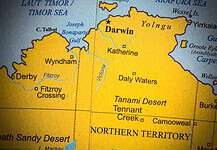IN its landmark 1992 Mabo decision, the High Court of Australia ruled that intrinsic indigenous land and water rights – Native Title – existed prior to European settlement.
Under the ‘right to negotiate’ provisions of the Commonwealth Native Title Act 1993, which provided legislative expression to the Mabo decision, indigenous communities share in prospective wealth when their lands are developed by mining companies.
The Act provides Traditional Owners with the opportunity to negotiate with mining companies to establish the terms under which development can occur.
Negotiated agreements offer numerous benefits, such as securing indigenous access to education, employment and business development opportunities, while offering high levels of cultural heritage and environmental protection.
The world’s second-largest gold producer, Newmont Mining Corporation, has agreements in place to provide employment for Aboriginal people at all of its Australian mines. At its Tanami gold project in the Northern Territory, it has detailed commitments under an agreement with the Central Land Council (CLC) that tackles the needs of indigenous people in the workforce and in the community.
In addition, Newmont maintains specific site-based policies regarding the protection of sacred sites, the recruitment of indigenous people, cross-cultural awareness training and community interaction.
Newmont also has agreements in place with Traditional Owners, who provide assistance with biodiversity management and monitoring issues.
For many years, Newmont and the CLC have partnered to gradually increase the number of Aboriginal workers employed at Tanami.
The Tanami operations are within Warlpiri traditional land, requiring Newmont to pay ongoing royalties to the Warlpiri people.
Communities in the areas surrounding the mining operations are compensated through the Granites Mine Affected Areas Aboriginal Corporation (GMAAAC), with the money divided between nine GMAAAC communities that choose which local organisations should be funded.
Royalties are also paid to the Warlpiri Education and Training Trust (WETT) project, and must be spent on local indigenous education and training. WETT project funding has assisted a youth and media program that offers diversionary activities for young indigenous people, with an emphasis on media training.
In March 2012, Traditional Owners in the Pilbara region of WA applauded the sensitive manner in which iron ore miner Flinders Mines negotiated with the East Guruma People to gain permission to operate on their land.
Flinders successfully negotiated a long-term agreement – including an annual monetary payment and job and business opportunities – spanning the 20 year life of its iron ore mine near Tom Price.
In June 2012, the Gillard government announced reforms to the Native Title Act that would make payments tax-free.
The government also assigned new legal powers to ensure groups negotiated seriously, and granted new access to parks and reserves with the aim of making indigenous land use agreements more flexible and less technical.
Advertisement











































